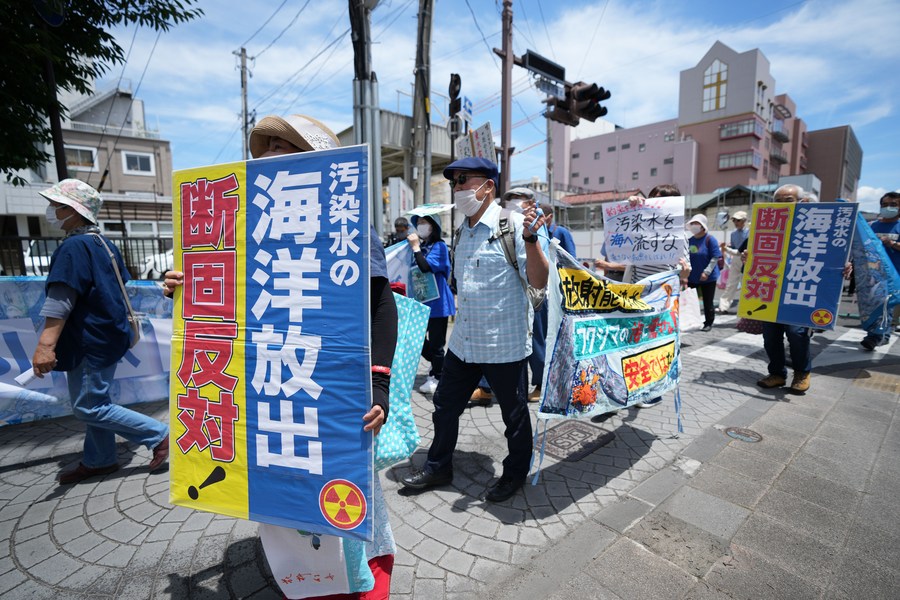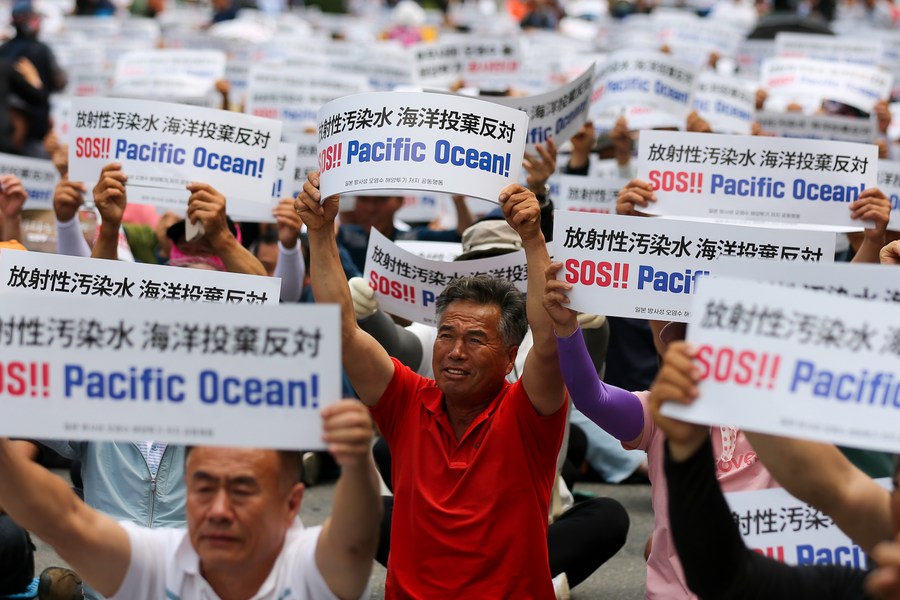
People protest against the Japanese government's plan to discharge nuclear-contaminated water into the sea in Fukushima, Japan, June 20, 2023. /Xinhua
People protest against the Japanese government's plan to discharge nuclear-contaminated water into the sea in Fukushima, Japan, June 20, 2023. /Xinhua
Japanese government's plan to discharge Fukushima nuclear-contaminated water into the sea may have a negative impact on the ecology of the Pacific Ocean, an Indonesian nuclear expert said.
Murdahayu Makmur, a marine radioecologist with Indonesia's National Nuclear Energy Agency raised her concern about Japan's discharge plan in a recent interview.
The nuclear contaminated water contains the radioactive substance tritium, and with the discharge of a large amount of nuclear contaminated water, there is concern whether the content of tritium in seawater will increase significantly and whether it will have an ecological impact, she said.
In addition, the nuclear contaminated water may contain other radioactive substances besides tritium, the expert added.
Nuclear contaminated water discharged into the sea will be driven by ocean currents and continue to spread. Marine life which move with the currents and the migration of marine fish will also drive the spread of radioactive materials, she said.
The radioecologist noted that if the tritium content in seawater and marine life continues to increase, the entire Pacific coast, including Indonesia, will be affected.
Indonesia is very concerned about the environment and seafood safety in the surrounding waters, and will closely monitor the level of radioactive substances in the surrounding waters, she added.
Growing anger and fears
Despite ongoing opposition from both locally and abroad, Japan has been rushing to carry out its plan to dump radioactive wastewater into the Pacific Ocean, causing growing anger and stoking fears among the global community.

A protest against Japan's planned discharge of nuclear-contaminated water in Seoul, South Korea, June 12, 2023. /Xinhua
A protest against Japan's planned discharge of nuclear-contaminated water in Seoul, South Korea, June 12, 2023. /Xinhua
The head of the Fukushima fisheries federation has again expressed opposition to the plan to release radioactive water from the crippled Fukushima Daiichi nuclear plant into the sea, local media reported on Wednesday.
During a meeting on Tuesday with the plant's operator Tokyo Electric Power Company (TEPCO), Tetsu Nozaki said the government and TEPCO had told the prefectural fisheries federation eight years ago that they would not dispose of the wastewater without gaining the understanding of the parties involved, the public broadcaster NHK reported.
The fishers have not endorsed the government and TEPCO's explanations about the discharge plan, Nozaki noted.
Secretary-General Henry Puna of the Pacific Islands Forum (PIF) warned in a statement on Monday that Japan's plan to dump nuclear wastewater into the sea "is not merely a nuclear safety issue. It is rather a nuclear legacy issue, an ocean, fisheries, environment, biodiversity, climate change and health issue with the future of our children and future generations at stake."
Leaders from multiple Pacific Island countries have urged Japan "to store or dump their nuclear waste in their home countries rather than storing or dumping them in the Pacific," the statement said, adding that people from the Pacific Island countries have gained nothing from Japan's plans, which puts future generations at great risk.
(With input from agencies)